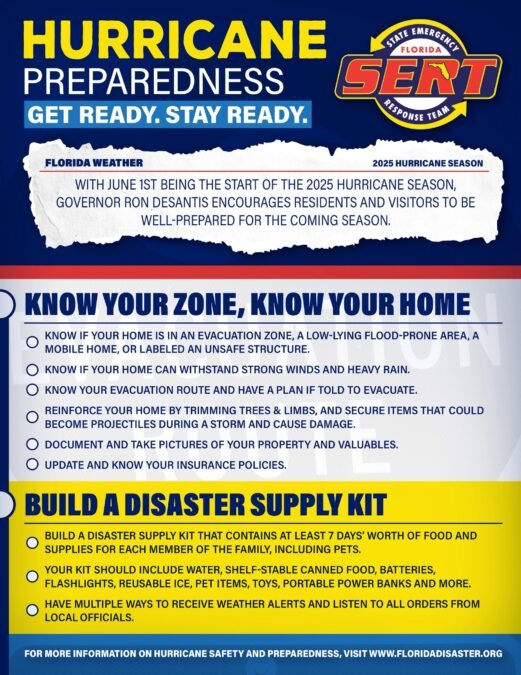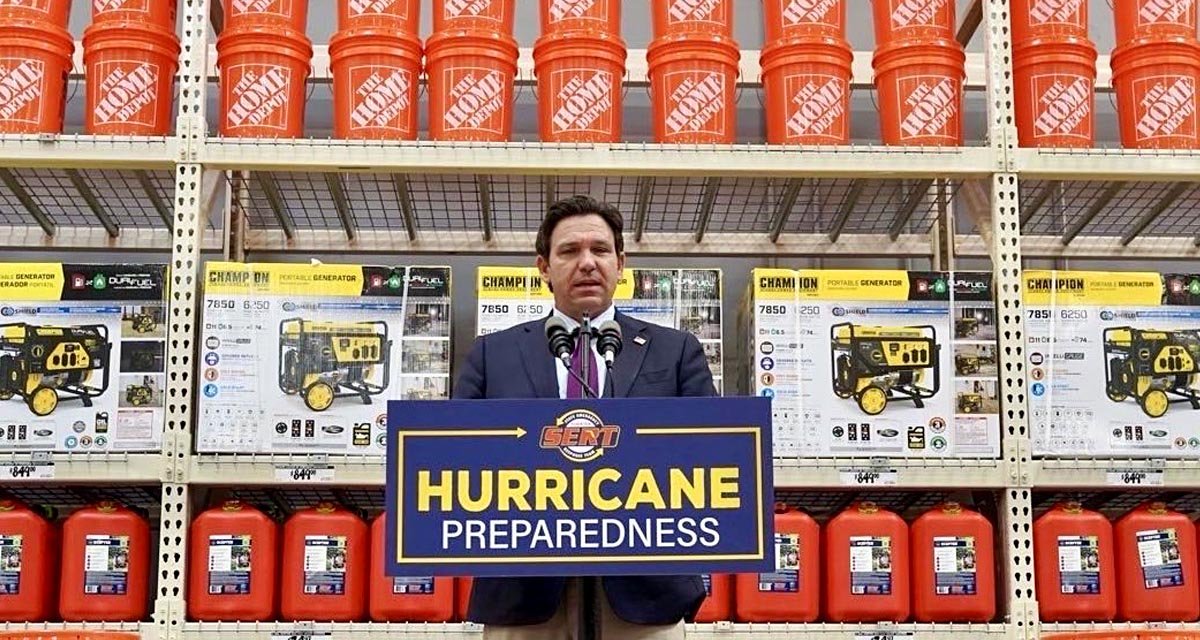Essential Tips for New Central Florida Residents
Welcome to Central Florida, where vibrant communities, theme parks, and sunny skies make Orlando an exciting place to live! However, as a new resident of the Greater Orlando area, it’s essential to prepare for the Atlantic Hurricane Season, which runs from June 1 to November 30. Governor Ron DeSantis recently highlighted the importance of readiness, stating, “Floridians must have a plan and supplies ready for the 2025 hurricane season to protect their families and homes.”
Unlike coastal areas, Orlando’s inland location in Orange, Seminole, and Osceola counties reduces the risk of storm surge, but heavy rain, flooding, and power outages are common during hurricanes. This guide, tailored for Orlando residents, uses FloridaDisaster.org as a primary resource to help you build a disaster supply kit, plan for sheltering in place, use generators safely, and leverage Florida’s tax-free holidays. Let’s ensure you’re ready to weather any storm in the City Beautiful!

Stocking Up: Your Hurricane Supply Kit
A well-stocked disaster supply kit is your first line of defense during a hurricane. FloridaDisaster.org recommends a minimum of seven days’ worth of supplies for every household member, including kids, seniors, and pets. Here’s a checklist tailored for Orlando residents:
- Water: Store one gallon per person per day for drinking and sanitation, plus extra for pets. Opt for reusable containers to stay eco-friendly.
- Food: Stock non-perishable items like canned soups, protein bars, and dried fruits. Include a manual can opener and pet food for furry companions.
- Lighting and Power: Keep LED flashlights ($40 or less), extra batteries (AA, AAA, D), and portable power banks ($60 or less) for outages, common in Orlando’s urban and suburban areas.
- Medical Supplies: Maintain a seven-day supply of prescriptions, over-the-counter medications, and items like contact lens solution or pediatric supplies.
- First Aid: Include bandages, antiseptic, and pain relievers for minor injuries during a storm.
- Documents: Store digital or physical copies of IDs, insurance policies, and medical records in a waterproof container.
- Extras: Pack tarps ($100 or less), duct tape, reusable ice packs ($20 or less), and a hand-crank weather radio for updates during outages.
Visit FloridaDisaster.org/kit for a detailed checklist.
New Orlando residents can build their kit gradually by adding items during weekly shopping trips to stores like Publix or Walmart in Orange, Seminole, or Osceola counties. For pet owners, include portable carriers or leashes ($40 or less) for safe transport.
Navigating Orlando’s Hurricane Risks and Shelter Plans
While Orlando is less prone to coastal storm surges, hurricanes can bring intense rainfall, flooding, and downed trees, especially in low-lying areas near lakes like Lake Eola or the Econlockhatchee River. Use FloridaDisaster.org/Know to check if your home in Orlando, Winter Park, or Kissimmee is in a flood zone.
Orange County’s Emergency Management site provides local shelter locations and flood maps specific to Central Florida.
Governor DeSantis notes, “Local officials will guide residents on when to shelter or evacuate.” In Orlando, evacuation is less common, but flooding in areas like Azalea Park or near the St. Johns River may require relocation to a nearby shelter.
What’s Your Plan?
Create a household plan at FloridaDisaster.org/PlanPrepare, ensuring:
- A designated safe room in your home, away from windows, for sheltering in place.
- A pet plan, as shelters like those in Orange County may have pet-friendly options (check ocfl.net).
- A communication plan with emergency contacts and registration for alerts at AlertFlorida (FloridaDisaster.org/AlertFlorida).
Keep your vehicle’s gas tank or electric charge at least halfway full, as fuel shortages can occur in Central Florida during storms.
For businesses in Orlando’s tourism-heavy economy, Business.FloridaDisaster.org offers tools to create a continuity plan to protect employees and operations.
Generators: Use Them Safely
Power outages are a reality during hurricanes, especially in Orlando’s urban grid. A generator can keep essentials like refrigerators or medical devices running, but safety is critical to avoid carbon monoxide risks or electrical hazards. Follow these tips from FloridaDisaster.org:
- Select the Right Generator: Choose a model ($3,000 or less) that meets your household’s needs, such as powering a fridge or AC unit.
- Outdoor Operation Only: Place generators at least 20 feet from your home’s windows or doors to prevent carbon monoxide poisoning.
- Professional Setup: Hire a licensed electrician in Orlando to install a transfer switch, ensuring safe connection to your home’s electrical system. Local services like those in Orange County can assist.
- Fuel Storage: Keep fuel in approved containers ($50 or less) stored away from living areas, and never refuel a running or hot generator.
- Regular Testing: Maintain your generator with monthly tests to ensure it’s ready for Orlando’s frequent summer storms.
Florida’s Tax-Free Disaster Preparedness Holidays
Florida’s Disaster Preparedness Sales Tax Holidays help Orlando residents save on hurricane supplies. In 2024, these periods ran from June 1–14 and August 24–September 6, as enacted by House Bill 7073. While 2025 dates are pending, they typically align with peak hurricane season. Tax-free items include:
- Flashlights, lanterns, and reusable ice ($40 or less)
- Batteries and fuel containers ($50 or less)
- Tarps and tie-down kits ($100 or less)
- Generators ($3,000 or less)
- Pet supplies like carriers or beds ($40 or less)
Visit floridarevenue.com/DisasterPrep for a complete list. Stock up at Orlando retailers like Home Depot or Target outside tax holidays to avoid shortages.
Orlando-Specific Preparedness Tips
- Home Protection: Secure outdoor furniture in your Orlando backyard or balcony, as high winds can turn items into projectiles. Trim trees near your home, especially in neighborhoods like Baldwin Park or Dr. Phillips, to prevent debris.
- Insurance Check: Review your homeowners’ or renters’ insurance for flood coverage, as standard policies often exclude flood damage. Document your belongings with photos for claims.
- Stay Updated: Follow Orange County Emergency Management on X or Instagram for local alerts, and use a weather radio during outages. Apps like AlertFlorida provide real-time notifications.
Final Thoughts
Living in Orlando offers a unique blend of urban excitement and natural beauty, but hurricane preparedness is a must. By building a disaster supply kit, understanding local flood risks, using generators safely, and utilizing resources like FloridaDisaster.org and ocfl.net, you can protect your family, pets, and property. Governor DeSantis emphasizes, “Florida is ready to support communities during hurricane season.” Stay proactive by connecting with local experts for generator setups or home fortification, and make preparedness a part of your Orlando lifestyle. Stay safe and enjoy all that Central Florida has to offer!
Stay Safe!

Get to know your neighbors and create a support network. Floridians come together during a crisis.
Power might go down and you don’t want to run out of water.
• When a storm gets near, fill your tub up with water.
• Get a service, like Culligans. It’s nice to have several 3 or 5 gallon jugs around when there’s a storm or a boil water alert.
• Get a solar charger for your phone.
• Get a solar generator to use in emergencies or when you’re out camping.
• Get an emergency radio. It’s possible to lose cell service.
• Write down contact numbers and web links to important services like power, phone, and internet. In an emergency you don’t want to have to scramble for it.
• Save all your important documents, like passports or checkbooks in one place.
• Pack a Go Bag.
Share your tips!